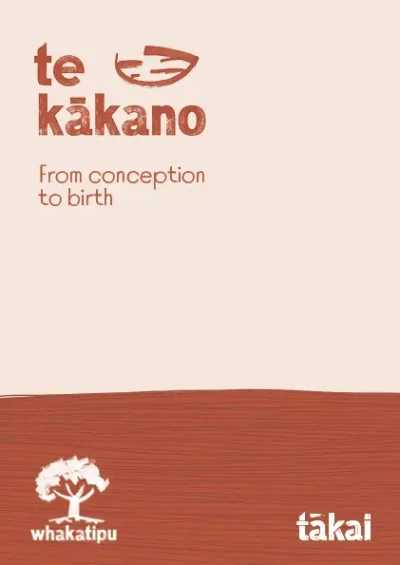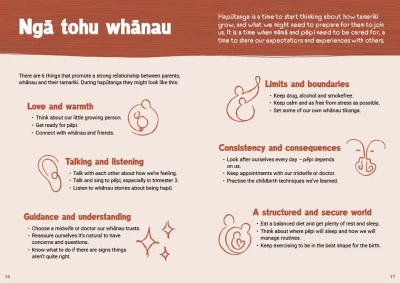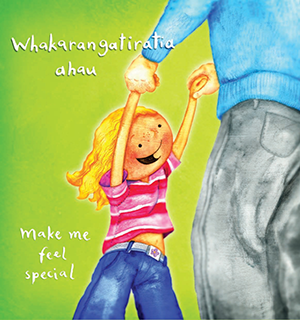
Alcohol while pregnant or breastfeeding
Drinking alcohol while pregnant can have serious consequences for pēpi. This is one of the most important issues to talk about with a pregnant parent and their whānau. It’s also recommended to avoid alcohol while breastfeeding.
There is no safe amount of alcohol at any time during pregnancy. Frequent heavy drinking causes the most harm for a developing pēpi, but any amount of alcohol can cause damage. This is why current health information advises pregnant people not to drink any alcohol while pregnant or breastfeeding.
The effects of drinking while pregnant
Some of the most serious and devastating effects can occur when pregnant parents drink alcohol very early in pregnancy. These effects include an increased risk of:
- miscarriage
- stillbirth
- premature birth
- low birth weight
- a tamaiti born with fetal alcohol spectrum disorder (FASD).
FASD is a neurodevelopmental disorder which results from prenatal alcohol exposure. It includes intellectual, physical, learning, and behavioural challenges. The effects vary for different tamariki depending partly on the timing and amount of alcohol they were exposed to.
The effects of drinking while breastfeeding
The alcohol a pregnant parent drinks can be passed on to pēpi in breastmilk and damage their developing brain. Alcohol should be avoided while breastfeeding.
For those who do choose to have a drink, wait at least 2 hours for each standard drink before breastfeeding – that’s 2 hours for 1 drink, and 4 hours for 2. The strength of alcoholic drinks can vary, so always check labels on bottles, cans and casks to see how many standard drinks are inside.
Identifying our own attitudes towards alcohol
There’s a very strong drinking culture in Aotearoa, so many pēpi are exposed to alcohol before birth, especially as a parent may not know they are pregnant until a few months into their pregnancy.
Support for whānau needs to be based on evidence on what is best for pēpi. This may mean being aware of your own attitudes to alcohol and setting them aside. Drinking is an intergenerational issue and a social activity that has become normalised, even in pregnancy. Pregnancies are also more likely to be alcohol exposed when partners drink.
Talking about alcohol use in pregnancy
Asking about drinking in pregnancy requires a good relationship with the whānau first. Care should be taken when discussing the effects of alcohol to avoid worry, confusion, or blame. Whānau will be more likely to accept support if they feel understood and know that the result is going to be helpful for them and their pēpi.
Here are some suggestions for when you talk to parents and whānau about alcohol.
- Show as much empathy and understanding as you can – this will allow you to have a productive conversation.
- Start off by asking something like ‘What do you know about booze and pregnancy?’
- The answer will give you a clue about what course your conversation will take.
The danger is that parents and whānau may interpret your questions as a judgement against them, and they may clam up or become resistant. If the pregnant parent is going to struggle to stay alcohol-free, support them to access relevant services as quickly as possible.
Reducing stressors to help reduce the risks
Some people may feel unable to stop drinking during their pregnancy, and this may be exacerbated by stress in their lives. Talking through possible solutions for these stress points, for example with housing, food, family violence, and any other matters that may cause stress, can encourage whānau to make healthier decisions, including for the pregnancy.
Key messages for whānau
There are lots of opinions about drinking that whānau may hold or have heard from others. Weaving the following points into your kōrero can support whānau with accurate information:
- There is no safe time to drink during pregnancy.
- There is no safe amount of alcohol for pēpi.
- All types of alcohol can cause harm.
If pēpi has already been exposed to alcohol, the sooner this stops the better their outcomes are likely to be.
The Alcohol Drug Helpline provides free, confidential information and support 24 hours a day to assist anyone with a question or concern about their own or someone else’s drinking or other drug use. Call 0800 787 797 or text 8681.
All pēpi are born with mana, and their own strengths and capabilities. Some tamariki who have been exposed to alcohol before birth face extra challenges and developmental delays. These challenges may become more apparent later in development, such as when they start school.
Conversation ideas
If parents have concerns about their tamaiti, approach the topic with compassion and understanding. Some ways of opening the conversation include the following:
Remember that just because a pēpi was exposed to alcohol, it doesn’t necessarily mean there is an issue or that the child will be affected with fetal alcohol spectrum disorder, which can only be diagnosed by a health professional. Parents should not be worried unnecessarily, but whānau supporters should encourage them to seek advice if there are also concerns about the development of the tamaiti. Whānau can start by talking to their family doctor, with an advocate present if they would like one
Seeking help early results in significantly improved outcomes for tamariki, whatever challenges are identified.
Learn more
Alcohol and pregnancy
Amohia Te Wairoa
Advice about not drinking alcohol when pregnant and resources for health professionals.
Drinking for two: how alcohol in pregnancy affects the developing child
Brainwave Trust Aotearoa
Information on the wide range of effects that alcohol exposure before birth can have on people.
Language guide (PDF, 1.8 MB)
FASD Hub Australia
Suggested language for use in conversations about FASD.
Helpful resources for whānau
-
Feed Safe app
WellSouth Primary Health Network
Feed Safe is a mobile app that assists breastfeeding mothers to make the best decisions about alcohol consumption.
-
Alcohol and pregnancy – what you might not know
HealthEd
A pamphlet reminding that alcohol is carried in the bloodstream, through the placenta and directly to baby.
-
Smoking, alcohol, and drugs when you are pregnant
Te Whatu Ora
Information and advice for whānau around substances to avoid when pregnant and breastfeeding.
 pdf 12 MB
pdf 12 MB













